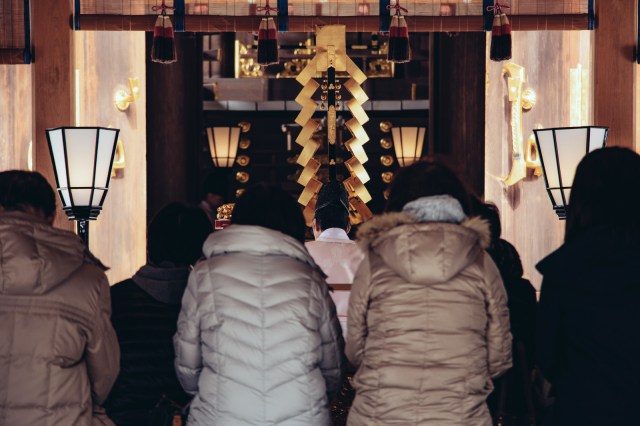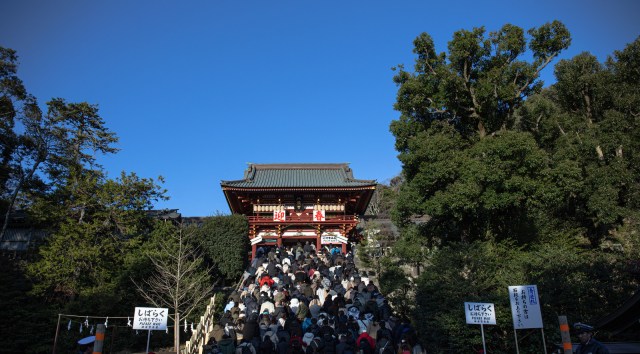
Suga administration hopes everyone doesn’t party quite like it’s 1999 this year.
It’s been a pretty hard year to say the least, so it sure would be nice to kick-off the next one on a good note. Judging by the buzz in the media, Japanese workers might just get that with an unprecedented 17 consecutive holidays over the New Year.
Under normal circumstances a business or government office would probably close after 28 December 2020 and then resume the following Monday, 4 January 2021. These six days would often be spent visiting relatives and shrines or taking advantage of the many seasonal bargains, as is the custom here.
This years looks to be different, however, as on 23 October the Minister in charge of Economic Revitalization, Yasutoshi Nishimura, announced that he is requesting companies to extend their year-end vacations until 11 January, which is the Coming of Age day holiday. The purpose is to hopefully stagger the crowds visiting shrines, traveling, and shopping over a wider period of time, thereby reducing their numbers at any given time and preventing COVID-19 infections.
▼ The crowds at shrines during this time can get quite dense
That would bring the total number of consecutive holidays to 14. However, with that lone Monday on 28 December, it would seem likely a lot of people will cash in a paid holiday then and put the grand total of days off at 17.
As we saw with the lack of lockdowns throughout this year, the government can’t force companies to comply but some people are still very optimistic about the news.
“Yay!!! Let’s go fly a kite!”
“Fantastic, I don’t want to do any more work.”
“After 17 days I’m going to forget how to tie a Windsor knot.”
“I was excited until I remembered I work at a hotel…”
“Hopefully the coronavirus will also take those days off.”
“Throw in another stimulus check and we’ll be all set.”
There was also a lot of criticism over the idea from various viewpoints. Firstly, there’s still a deadly pandemic going on and some are expecting it to pick up steam in the mid-winter months where this prolonged holiday happens to be. However, the government managed to plow through the second wave of COVID-19 with their “Go To” campaign, offering financial incentives for domestic travel. As a result, cases were still relatively under control.
Also, this being a plan by the Minister in charge of Economic Revitalization, the goal is also to revitalize the economy. While an extra week of free time will certainly stimulate some personal spending, that seems to be a rather short-term solution overall.
On top of that, there are many workers, from medical staff to convenience store clerks, who can’t benefit from this due to the nature of their work. Even those who do get the time off, like non-salaried temp workers, might not be too thrilled about it. Last year, Japan saw an extended 10-day holiday as Emperor Naruhito took the throne, which ended up putting an extra-hard squeeze on the incomes of those who earn money on a day-to-day basis.
▼ An added stimulus check, which is also currently being discussed, would go a long way to help there. After all, monetary gifts are also a big part of New Year’s in Japan
If all that wasn’t enough, while more commerce would be going on at the front lines, the companies themselves would be shutting down for a about another full week, which may very well still result in a net negative on the Japanese economy as a whole.
So there appears to be no shortage of reasons not to do this, but the government says they did the research and believe in the idea. I’m inclined to believe them too…because 17 days off in a row would be pretty sweet.
Source: Nikkan Gendai, Mainichi Shimbun, Itai News
Top image: Pakutaso
Insert image: Pakutaso (1, 2)
● Want to hear about SoraNews24’s latest articles as soon as they’re published? Follow us on Facebook and Twitter!



 Tokyo Olympics to allow spectators, provided they “cheer quietly”
Tokyo Olympics to allow spectators, provided they “cheer quietly” Overworked Japan celebrated Labor Day on a Saturday this year
Overworked Japan celebrated Labor Day on a Saturday this year What pandemic? Onsen towns, hiking trails and theme parks packed with crowds on four-day weekend
What pandemic? Onsen towns, hiking trails and theme parks packed with crowds on four-day weekend Man who accidentally received entire town’s COVID-19 relief money vanishes
Man who accidentally received entire town’s COVID-19 relief money vanishes Weak yen should have Japan fast-tracking reopening to foreign tourists, prominent politician says
Weak yen should have Japan fast-tracking reopening to foreign tourists, prominent politician says Japan’s new difficult-to-drink-from beer glass protects your liver, but it’s a brutal experience
Japan’s new difficult-to-drink-from beer glass protects your liver, but it’s a brutal experience How to order snacks on a Shinkansen bullet train in Japan
How to order snacks on a Shinkansen bullet train in Japan New samurai glasses are Japan’s latest weird must-have souvenir
New samurai glasses are Japan’s latest weird must-have souvenir “Deflowering” services for virgin women are now a thing in Japan, apparently
“Deflowering” services for virgin women are now a thing in Japan, apparently Doraemon found buried at sea as scene from 1993 anime becomes real life【Photos】
Doraemon found buried at sea as scene from 1993 anime becomes real life【Photos】 Burger King Japan suddenly adds Dr. Pepper and Dr. Pepper floats to its menu nationwide
Burger King Japan suddenly adds Dr. Pepper and Dr. Pepper floats to its menu nationwide Hello, cosmetics! Clinique teams up with Hello Kitty this summer for first-time collaboration
Hello, cosmetics! Clinique teams up with Hello Kitty this summer for first-time collaboration Princesses, fruits, and blacksmiths: Study reveals the 30 most unusual family names in Japan
Princesses, fruits, and blacksmiths: Study reveals the 30 most unusual family names in Japan High-fashion Totoro cuddle purse is like an elegant stroll in the forest【Photos】
High-fashion Totoro cuddle purse is like an elegant stroll in the forest【Photos】 Demon Slayer: Kimetsu no Yaiba gets new roller coaster attractions and food at Universal Studios Japan
Demon Slayer: Kimetsu no Yaiba gets new roller coaster attractions and food at Universal Studios Japan Nintendo history you can feel – Super NES, N64, and GameCube controllers become capsule toys
Nintendo history you can feel – Super NES, N64, and GameCube controllers become capsule toys “The most Delicious Cup Noodle in history” – Japan’s French Cup Noodle wins our heart【Taste test】
“The most Delicious Cup Noodle in history” – Japan’s French Cup Noodle wins our heart【Taste test】 Starbucks releases a cute Frappuccino and Unicorn Cake…but not in Japan
Starbucks releases a cute Frappuccino and Unicorn Cake…but not in Japan Kyoto Tower mascot termination reveals dark side behind cute Japanese characters
Kyoto Tower mascot termination reveals dark side behind cute Japanese characters McDonald’s Japan’s Soft Twist Tower: A phantom ice cream only sold at select branches
McDonald’s Japan’s Soft Twist Tower: A phantom ice cream only sold at select branches Yabai Ramen: What makes this Japanese ramen so dangerous?
Yabai Ramen: What makes this Japanese ramen so dangerous? Finally! Nintendo Japan expands Switch 8-bit controller sales to everybody, Online member or not
Finally! Nintendo Japan expands Switch 8-bit controller sales to everybody, Online member or not Japanese government wants to build luxury resorts in all national parks for foreign tourists
Japanese government wants to build luxury resorts in all national parks for foreign tourists To combat declining birth rate, Japan to begin offering “Breeding Visas” to foreigners
To combat declining birth rate, Japan to begin offering “Breeding Visas” to foreigners 10 things you should buy at 7-Eleven in Japan
10 things you should buy at 7-Eleven in Japan Studio Ghibli releases anime heroine cosplay dresses that are super comfy to wear
Studio Ghibli releases anime heroine cosplay dresses that are super comfy to wear Woman charged for driving suitcase without a license in Osaka
Woman charged for driving suitcase without a license in Osaka Studio Ghibli unveils My Neighbour Totoro miniature house model
Studio Ghibli unveils My Neighbour Totoro miniature house model Kyoto experiencing problems with foreign tourists not paying for bus fares, but not on purpose
Kyoto experiencing problems with foreign tourists not paying for bus fares, but not on purpose Fighting mild hunger with a Japanese soda that turns into jelly in the stomach【Taste test】
Fighting mild hunger with a Japanese soda that turns into jelly in the stomach【Taste test】 Studio Ghibli’s Howl’s Moving Castle tapestry unveiled in Japan for first time
Studio Ghibli’s Howl’s Moving Castle tapestry unveiled in Japan for first time McDonald’s new Happy Meals offer up cute and practical Sanrio lifestyle goods
McDonald’s new Happy Meals offer up cute and practical Sanrio lifestyle goods Sales of Japan’s most convenient train ticket/shopping payment cards suspended indefinitely
Sales of Japan’s most convenient train ticket/shopping payment cards suspended indefinitely Sold-out Studio Ghibli desktop humidifiers are back so Totoro can help you through the dry season
Sold-out Studio Ghibli desktop humidifiers are back so Totoro can help you through the dry season Japanese government to make first change to romanization spelling rules since the 1950s
Japanese government to make first change to romanization spelling rules since the 1950s Foreigner’s request for help in Tokyo makes us sad for the state of society
Foreigner’s request for help in Tokyo makes us sad for the state of society Ghibli founders Toshio Suzuki and Hayao Miyazaki contribute to Japanese whisky Totoro label design
Ghibli founders Toshio Suzuki and Hayao Miyazaki contribute to Japanese whisky Totoro label design Tokyo’s most famous Starbucks is closed
Tokyo’s most famous Starbucks is closed COVID-19 cases plummeting in Japan, doctors puzzled why
COVID-19 cases plummeting in Japan, doctors puzzled why Breaking: Japanese Prime Minister finally takes a day off after 148-day work streak
Breaking: Japanese Prime Minister finally takes a day off after 148-day work streak Japanese Emperor abdication date revealed by government officials in new report
Japanese Emperor abdication date revealed by government officials in new report Coronavirus vaccinations for general public in Japan to start in mid-July at the earliest
Coronavirus vaccinations for general public in Japan to start in mid-July at the earliest Japan’s newest holiday “Mountain Day” gets approval from Lower House
Japan’s newest holiday “Mountain Day” gets approval from Lower House U.S. government lowers Japan travel warning level
U.S. government lowers Japan travel warning level Japanese government mulling over potential four-day working week
Japanese government mulling over potential four-day working week Japan chooses to go to the moon
Japan chooses to go to the moon Japanese prime minister accidentally asked about government’s massive “Robbery Campaign” budget
Japanese prime minister accidentally asked about government’s massive “Robbery Campaign” budget End of the Heisei Era: Japanese government to announce new era name on 1 April
End of the Heisei Era: Japanese government to announce new era name on 1 April Overworked Japanese employees mourn unused paid holidays at new Buddhist memorial service
Overworked Japanese employees mourn unused paid holidays at new Buddhist memorial service 23 people arrested in Aichi for operating and using illegal casino during coronavirus lockdown
23 people arrested in Aichi for operating and using illegal casino during coronavirus lockdown Japan’s population of people over 100 surpasses 90,000 for first time
Japan’s population of people over 100 surpasses 90,000 for first time Toyama Prefectural University able to locate potential COVID-19 clusters from raw sewage
Toyama Prefectural University able to locate potential COVID-19 clusters from raw sewage Japanese government to give all 18-and-under residents 100,000 yen… here’s why that’s bad news
Japanese government to give all 18-and-under residents 100,000 yen… here’s why that’s bad news Asahi Breweries to gift its over 3,000 employees with 30,000 yen each to eat out
Asahi Breweries to gift its over 3,000 employees with 30,000 yen each to eat out
Leave a Reply